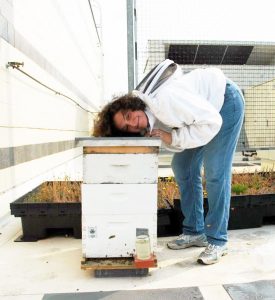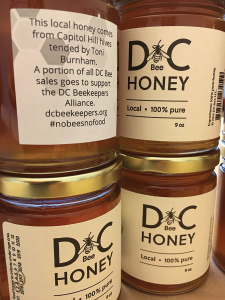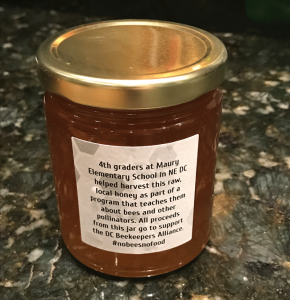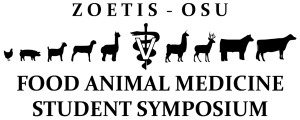By: Toni Burnham
You Can Do This

Toni Burnham
www.twitter.com/tonibee
www.citybees.blogspot.com
About a year and a half ago, one of my favorite newbee-ish beekeepers asked me to lunch. Though she’s one of my favorite people, my heart sank.
You see, Nicole Gaouette is one of those folks who got into beekeeping very seriously and insightfully, and get hooked hard. At the end of her very first summer, a beekeeper with nine or so hives at her outside-the-city communal garden pulled up stakes and left, and Nicole adopted five of those hives. Five. In August. All harvested dry in craptastic woodenware that hadn’t seen paint in years. With questionable queens.
These few months later, I figured that probably she’d asked for lunch to say that she’d had enough, she wanted out, could the club take those colonies please.
Sigh. It happens.
Instead, Nicole showed up smiling, wearing a coolio honey bee pendant, and sporting a lovely idea that sounded mighty impractical to me. Luckily for all of us, my level of insight was pretty much nil concerning the whole gamut of hives, lunch and her inspiration. Why was I so ready to say, “No way?” Perhaps after few years of trying just about every foolhardy thing you can think of, ambition was wearing thin a little bit, even when someone this lovely to be with and clever and caring comes up with a good one.
Nicole’s idea was this: most of the newbees around town who had finally wintered colonies and harvested honey had certainly gotten a charge out of that crop, but after sharing jars with friends and relatives, many still had the better part of a bucket left. Also, they tended to have to borrow harvesting gear, and sometimes discovered later that a second pull of frames was in order, even though they had satisfied their personal demand and enjoyed the hot-and-sticky harvest experience enough for one year.
Sure, each beek selling on his or her own was a possibility, but that means ordering jars and labels and finding a store and calculating markups and going through all that trouble to move, maybe, 20-30 jars. And what if the Health Department gets interested?! Even at pretentious city prices, that’s a lot of work for maybe $200-$300 after costs.
 So Nicole’s idea was this: DC Bees LLC. She proposed reaching out to the amateur DC beekeeping community, and offering to take either liquid honey in the bucket or frames straight out of the colonies themselves, and to harvest, bottle, label, and market the jars. DC Bees would give a share of the proceeds to the beekeepers, use a share to cover fixed costs, and donate a percentage to the DC Beekeepers Alliance, our community. She wanted my permission to use our communications channels to try.
So Nicole’s idea was this: DC Bees LLC. She proposed reaching out to the amateur DC beekeeping community, and offering to take either liquid honey in the bucket or frames straight out of the colonies themselves, and to harvest, bottle, label, and market the jars. DC Bees would give a share of the proceeds to the beekeepers, use a share to cover fixed costs, and donate a percentage to the DC Beekeepers Alliance, our community. She wanted my permission to use our communications channels to try.
I thought she was on track to break her own heart. My own honey has never stuck around long, at least in part because of feeding it to school kids and bribing public officials (kind of). A seemingly unlimited number of hardware stores, street markets, gourmet food shops–even the local Whole Foods–wanted anything they could get. I thought she would not find an unallocated golden drop.
But I said, “OK.” At some point, a founder must get out of the way, and to unlearn all the sardonic lessons that come with pushing pushing pushing all the time (and maybe not being as organized and decisive as she might need to be. Gulp.)
So a deep breath and a skeptical yes. And then I told her that she was pretty much on her own: I just could not manage one more thing.
 Then do you know what Nicole did? She incorporated, she got training and advice from local incubator programs (including one with the aforementioned Whole Foods). She got permits and a bank account and access to Health Department certified harvesting facilities. She designed labels, and came up with a fantastic design that incorporates the story of the beekeeper and the source of the honey on the back. She made friends with local bakers and community markets to give her shelf space (this is valuable real estate in a city where hot spots rent at $100 per square foot). it was important to her that this very local product reach folks via intrinsically local channels. And she made it absolutely clear that supporting our community was the engine behind the whole thing.
Then do you know what Nicole did? She incorporated, she got training and advice from local incubator programs (including one with the aforementioned Whole Foods). She got permits and a bank account and access to Health Department certified harvesting facilities. She designed labels, and came up with a fantastic design that incorporates the story of the beekeeper and the source of the honey on the back. She made friends with local bakers and community markets to give her shelf space (this is valuable real estate in a city where hot spots rent at $100 per square foot). it was important to her that this very local product reach folks via intrinsically local channels. And she made it absolutely clear that supporting our community was the engine behind the whole thing.
She came to a club meetup last Fall, and gave a short talk, with pictures, about all she had done and how she hoped she could help other beekeepers and the club. She described the powerful reaction that people had to the honey and the stories, and how she would love to create a way to make more of that happen.
And it did happen. The club already has a coupla hundred dollars in the bank from this thing, which is going to buy us one heck of a refractometer to go in the harvesting set that members can borrow. I had some half buckets around myself after some in-school programs, and I forked those over, with the stories about third graders and cemeteries and newly arrived fourth-generation Albanian beekeepers and all the other gorgeous randomness which is urban beekeeping.
This has a major impact on the people who buy the small-but-pricey jars and nonetheless feel better for it. Hope and inspiration can be thin on the ground sometimes, and the idea that you are holding the work of your neighbor and the bees in your garden in your hand, that it’s delicious and sustainable and you helped make it so…well, you know? This is honey-like-a-hug and a promise of more summers ahead.
At present, DC Bees LLC is not yet cash flow positive (hey, not even a year in operation, and Nicole launched after the main pathetic flow in 2016) But next year’s harvest is coming, and perhaps this model offers something to those of you in our greater beekeeping community. Our beekeepers are going into next year with the idea that they can get only those jars that they need, that they could get a little cash besides, and it all builds a sustainable community for them, their families and their neighbors.
We’d love to hear your feedback: have any of you tried something like this? Are you in a similar business which would allow you to direct us away from a very nearby cliff?
Do you want to buy some from the next batch?
Toni Burnham lives and keeps her bees on rooftops in Washington, DC.






